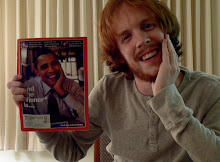
Politically, this decade has been an eventful one, and today, with Specter's big switch, its final months just got a lot more interesting. What began as the decade of "compassionate conservatism" has become the decade of GOP civil war, pitting hardcore social conservatives against more moderate factions of the party in a battle to the death...or something less dramatic.
Let's look at how this 10-year-long debacle began, shall we?
In the 90's, Bill Clinton oversaw the final years of the Boomer-dominated Democratic Party. His reluctance to take strong stances on social issues may have been justified (after all, his early push for the rights of gays in the military did not go too well), but it is a quality that Obama, as well as younger Democratic voters, does not share. With the Lewinsky scandal firmly in the past, Clinton's presidential legacy flourished during Bush's tenure in the White House; "Come Back Bill, All is Forgiven" was a popular bumper sticker slogan during Bush's first term.
But Clinton's presidency was not always so highly regarded; his reign in D.C. was marked by fierce Congressional opposition as well as virulent hostility from the FreeRepublic crowd. Ultimately, the Clinton years did little to cement Democratic influence in Washington, while Newt Gingrich managed to hold more sway than almost every other Speaker of the House before him. So, the decade that began with a pushback against the conservative culture wars of the 1980s ended with weariness and apathy dominating Democratic voters. However, Clinton's presidency strengthened the Democratic party in the long run, solidifying the support of younger voters, as well as de-emphasizing the politically correct, overly cautious elements of the party.
In a similar way, Bush & Cheney may have overseen the final years of the American Right as we know it. Many writers are speculating about a "permanent Democratic majority" the same way Rove spoke about Republican dominance in 2004; but this is as logically unsound an idea as it was when Karl said it in 2004. No party is immune to backlash, and the newly dynamic Democratic party only emerged after eight long, frustrating years of political defeats. That's why I'm convinced that it is impossible to judge the future of the GOP by its complete self-destruction during the 2008 campaign. While Republicans currently lack an effective platform, I'm certain that Obama will provide them with enough fodder to energize their base, and world events always lend themselves to party talking points come election time.
So, the future of the GOP may be uncertain, but I think this whole "death of conservatism" phenomenon is being taken a little too literally. What has happened is the complete erasure of the big tent Republican Party of the 1960s, replaced with a body of voters who value idealogical agreement over practical governance and political pragmatism. Essentially, they have become the Democratic party of the 1980s.
One thing Specter's change of heart indicates is that the battle lines between the parties have been permanently redrawn. For the first time since Ronald Reagan, Republicans have found themselves fighting for the trust of the American public, and losing.
By my reckoning, as well as Megan McCain's, the recent dominance of the Democratic Party is largely due to the Republican refusal to modernize their platform along with changing social norms. The gay marriage issue will provoke legit conservative outrage for another decade, but the younger generations' attitudes to homosexuality are completely out-of-step with the Republican position; as reformed neocon Andrew Sullivan* points out, framing the gay community as godless enemies will only serve to alienate future voters.
The GOP love them some sour grapes, so the reaction to Specter's abandonment has been pretty predictable: Michelle Malkin called him the "head of the Turncoat caucus," and Rush asked him to take Megan McCain with him when he goes. However, Olympia Snowe (another member of Malkin's "Turncoat caucus," I'm sure) hit the nail on the head when she attributed Specter's switch to the "exclusionary policies and views towards moderate Republicans" within the GOP. Snowe may not follow Specter's lead by switching, but she is voicing a very practical argument that a Democrat could not make so effectively.
Of course, many will call both Specter and Snowe RINOs (Republicans in Name Only), and maybe they're correct; but if they don't fit the definition of a Republican, it's because Bush's presidency forever changed the party's identity and purpose.
Nate
*I'm just playin'! Mr. Sullivan has more than made up for the mistakes of his past. He's a-ok in my book.

